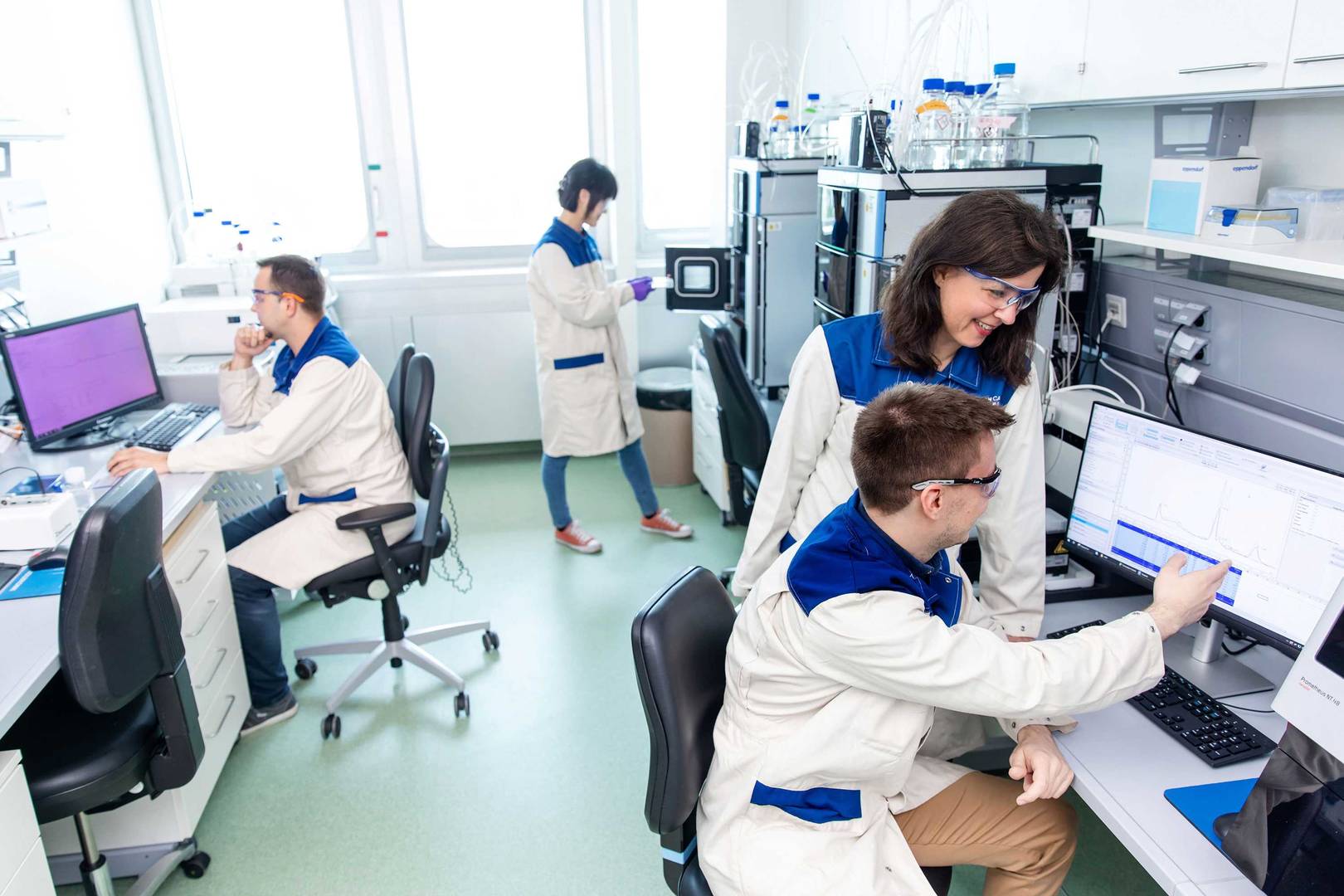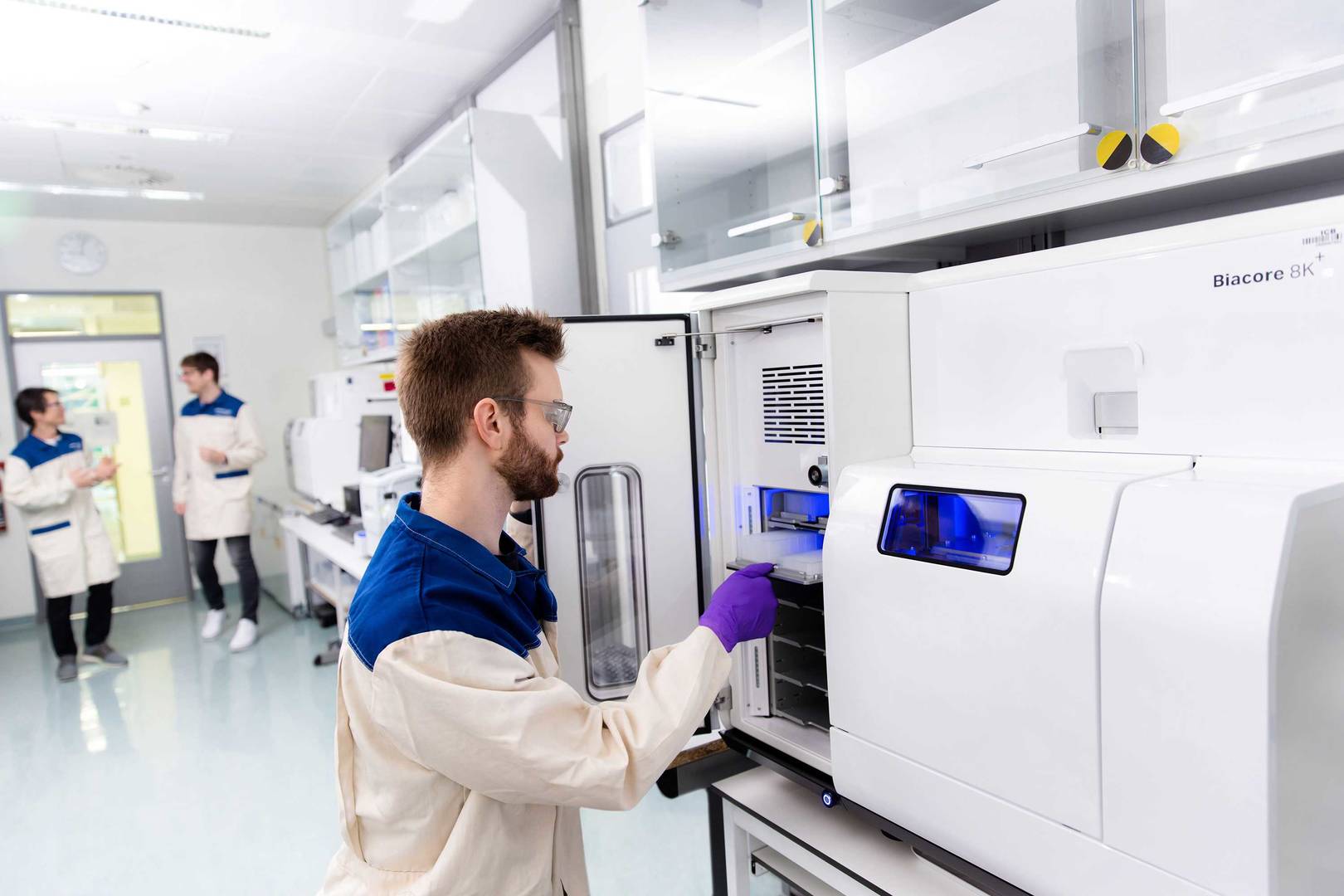Mass spectrometry (MS) forms the cornerstone of advanced protein science. We offer a comprehensive range of MS technologies to meet your analytical needs. With years of expertise and a dedicated team of scientists and lab professionals, we are ready to deliver solutions that propel your research forward. Understanding that every protein is unique and each challenge requires a tailored approach, we work closely with you to develop customised solutions that fit your specific requirements.

Working closely with our protein group, we integrate MS into the protein production process for comprehensive quality control. We use the Q-Exactive Plus platform for in-gel proteolytic cleavage followed by LC–MS/MS-based peptide mass fingerprinting to confirm protein identity and identify unknown bands on SDS pages. Intact mass analysis provides additional confidence by detecting post-translational modifications (PTMs) and confirming point mutations. Native MS is incorporated to verify key interactions, such as metal ion or nucleotide binding, essential for catalytic activity and functional integrity. Our extensive experience covers a wide range of proteins, including membrane and soluble proteins, antibodies and antibody-drug conjugates (ADCs), as well as RNA, helping ensure the highest quality standards.
Our MS-based analysis for antibody-drug conjugates (ADCs) offers precise insights into both antibody identity and drug conjugation, tailored to support your projects. Using LC-TOF MS, we can accurately determine the drug-to-antibody ratio (DAR), assess drug binding frequency and help ensure the drug remains intact post-conjugation. Our optimised data analysis workflow detects variations in conjugation patterns, identifies potential site-specific modifications and evaluates ADC stability. This approach enables you to identify potential heterogeneity in ADC preparations, such as variations in conjugation sites or incomplete conjugation. With our MS-based analysis, you can receive reliable, high-quality data that supports the optimisation of ADC development, helping ensure the safety, efficacy and consistency of your therapeutic.
Screening compound libraries by mass spectrometry is highly attractive due to its direct readout, high throughput and truly label-free nature. Our high-throughput capabilities with MALDI-MS enable efficient screening of large compound libraries (100k-1m), while LC–MS (RapidFire) is ideal for orthogonal screening or smaller, focused libraries. This flexibility allows us to optimise your screening process, helping ensure faster and more accurate results at any scale.
For new covalent inhibitors, we use intact mass measurement of the target protein after incubating covalent warhead library members at fixed times and protein-to-compound ratios. A robust electrospray time-of-flight instrument is employed for this purpose. We further validate hits over time, using the protein of interest with targeted amino acid mutations as negative controls when available. Alternatively, we perform peptide mapping to identify the modified amino acids on the target protein.
To prioritise your hits for lead optimisation, we determine the kinact/KI value, a critical parameter describing the efficiency of covalent bond formation. Additionally, we use MALDI-MS and short model peptides containing reactive amino acids (e.g., cysteine) to test the reactivity of new or unknown covalent warhead libraries. This comprehensive approach helps ensure that you receive reliable data to drive the development of your therapeutic candidates.
AS-MS efficiently screens large compound libraries to identify potential binders to your target biomolecules. This high-throughput capability is particularly effective for complex targets like membrane proteins and protein complexes, which are challenging to analyse with traditional methods. AS-MS’s flexibility accommodates a wide range of targets, making it ideal for high-value research in biologically relevant systems.
A key strength of AS-MS is its ability to separate unbound small molecules from target biomolecules using magnetic bead-based affinity selection in a 384-well format. This helps ensure clean and reliable data by selectively capturing bound compounds and removing unbound ones, helping enhance analysis accuracy.
We leverage the power of AS-MS to accelerate your research and drug discovery projects. With the expertise of our mass spectrometry specialists, screening and protein production experts and chemists, we can deliver precise, reliable results. Whether you are screening for potential small molecule binders, validating screening hits or studying complex biomolecular interactions, our AS-MS platform offers an efficient, flexible and reliable solution for your needs.
We support your research with a dedicated platform for screening covalent compound libraries and in-depth hit characterisation. Using state-of-the-art ESI-TOF mass spectrometry, we confirm covalent binding interactions and provide precise characterisation of small molecule binders. Our flexible approach includes time-course and concentration-dependent analyses to evaluate kinetics and binding efficiency. Additionally, we determine the kinact/KI value to prioritise candidates for lead optimisation, to help ensure we identify the most promising therapeutics for your needs. For non-covalent interactions, we use native mass spectrometry to preserve these interactions, enabling us to measure protein–ligand and protein–protein interactions accurately. Native MS allows us to analyse binding stoichiometry, competitive versus cooperative binding modes and study protein complexes. This can enhance your understanding of molecular interactions, which is critical for advancing your drug discovery and structural biology projects.

Discover how we can support your project with our protein production and purification solutions.
learn more
Our biophysical platform can support you with your lead identification and optimisation efforts.
learn more
Perform advanced proteomic analyses to understand disease mechanisms and enhance drug discovery.
learn more